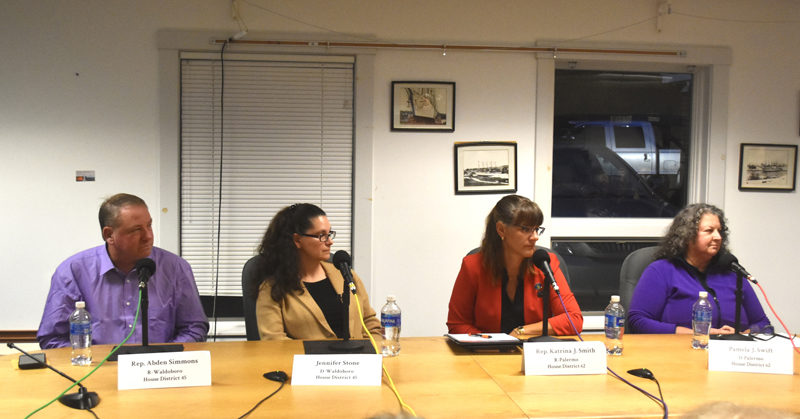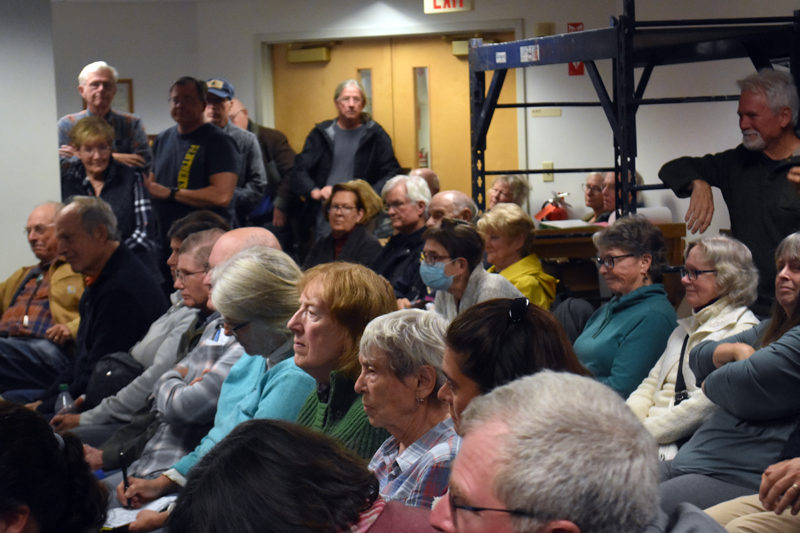
From left: House District 45 candidates Rep. Abden Simmons, R-Waldoboro; and Jennifer Stone, D-Waldoboro; and House District 62 candidates Rep. Katrina J. Smith, R-Palermo; and Pamela J. Swift, D-Palermo; listen to a question at a candidates forum in the Waldoboro municipal building on Monday, Oct. 7. (Molly Rains photo)
Four candidates vying for seats in the Maine House of Representatives discussed hot-topic issues from health care and education to illegal marijuana grow sites on Monday, Oct. 7, at the fourth of five candidate forums co-hosted by The Lincoln County News and Boothbay Register.
Continuing a trend of significant public attendance at this election season’s forums, more than 50 attendees crowded the Waldoboro municipal building’s meeting room for the event. The forum was also livestreamed on The Lincoln County News’ Facebook page.
Participants included candidates for House District 45, which includes Bremen, Louds Island, and Waldoboro in Lincoln County as well as Washington and Friendship. State Rep. Abden Simmons, R-Waldoboro, was joined by challenger Jennifer Stone, D-Waldoboro.
Candidates in the race for House District 62 were also featured.
District 62 were also featured. House District 62 includes Hibberts Gore and Somerville in Lincoln County, as well as the towns of China, Palermo, and Windsor. State Rep. Katrina J. Smith, R-Palermo, was joined by challenger Pamela J. Swift, D-Palermo.
The forum, which lasted just under 90 minutes, was moderated by The Lincoln County News Publisher John Roberts.
The candidates first discussed the issues that they believe are most pressing for their constituents. Simmons, Stone, and Smith identified taxation as a common concern.
Simmons, a commercial shellfish harvester and dealer and Waldoboro selectman, said a major concern related to rising taxes was ensuring that people are not priced out of their homes. He said he was in opposition to the repeal of L.D. 1, which was rescinded in 2024. L.D. 1, originally passed in 2005, established a cap on the amount a municipality can raise its budget from year to year, unless residents vote to authorize the town to exceed that cap.
Now that the law has been rescinded, Simmons said, “there are no checks and balances on that, and that was wrong. I think that should be brought back.”
Regarding the high cost of living, Simmons said the phenomenon of price gouging was rampant in the solar energy industry. He suggested capping the amount that solar energy companies can charge consumers to combat high energy bills.
Simmons also suggested expanding the homestead exemption and introducing a property tax structure that favors full-time residents over part-time or second-home owners to further address rising tax bills.
Stone, a stay-at-home mother from Waldoboro who is running for office for the first time, said she was concerned about the effects of rising property taxes and was “very disappointed” that Maine’s former property tax stabilization program for senior citizens had been rescinded.
“I would like for us to see a way of bringing that back, maybe on a graduated income level,” she said.
Later, Stone also discussed implementing a wealth tax to address the tax burden on average Mainers and “people who are struggling.” Meanwhile, she also said it was important to invest in Maine through taxes.
“What you put in is what you get out, and we all need to contribute,” she said.
Smith, a Realtor who was elected to the House in 2022, said spending needed to be cut in many areas to curtail taxes.
“We have so many services that are just not needed,” she said, identifying climate-related policies, like net energy billing, as unnecessary. Through the net energy billing program, which was originally established in 2020, individuals receive credits on their electricity bills in exchange for using electricity from renewable sources, such as solar panels they own or share with others.
“Your electricity bills have gone up because of the quest for clean energy,” Smith said.
Smith said developments like solar farms also threatened farmland and Maine’s tourism economy.
She also identified education as a spending area that could be curtailed to control costs.
“We have some of the highest administrative costs in the country in our schools, and that needs to be reined in,” she said.
Swift, a retired OB/GYN and Palermo Select Board member, said reproductive freedom was among her constituents’ major concerns.
“No matter how you feel about abortion, most would agree that the government, and politicians, should not have a role in making that decision,” she said.
“The foundation of all our rights is bodily autonomy … Without bodily autonomy, women are relegated to second-class citizens,” Swift said.
Swift also discussed taxation and inflation, saying a major factor in the persistence of high prices post-pandemic was price gouging by large corporations. The Maine Legislature, Swift said, could introduce legislation to penalize corporations that charge consumers unnecessarily high prices.
Increasing access to affordable child care and health care could also help Mainers amid the cost of living crisis, she said.
The candidates moved on to discuss the state of public education in Maine.
Swift said that she favors continuing to fund education, including through the Free Meals for All program, which supplies breakfast and lunch for free to all Maine public school students.
“An educated populace is critical,” she said.
Smith said Maine’s public schools were underperforming.
“Does our education system deserve more resources, when we’re 43rd in the nation?” she asked.
The national ranking of Maine’s education system differs among reports. A 2024 U.S. News and World Report ranking placed Maine at 43rd based on factors including standardized test scores; rates of preschool enrollment, high school graduation, and college graduation; average student debt; and tuition and fees at public colleges.
“In a lot of areas, the odds are stacked against (public education),” Simmons said.
State funding was unequally distributed among Maine’s counties and school districts, Simmons continued, unfairly benefitting schools in the southern portion of the state in a system he said must be changed.
Investing in schools, said Stone, was a way to invest in the long-term health of Maine communities by encouraging youth to remain in their communities.
The candidates discussed the prevalence of illegal marijuana-growing operations in the state, agreeing that the practice was a challenge for the legislature to address.
Simmons suggested that more steps could be taken to create policy requiring electrical utility providers to report sudden increases or large draws on the power supply, which may indicate a growing facility. He also said that confiscating the property upon discovery would deter unpermitted growers.
Smith said she had attempted emergency legislation to address the problem that was “shot down,” and agreed that further steps were warranted.
Based on her experience dealing with a suspected growing facility in Palermo, Swift said existing regulations are unclear and insufficient to address the problem.
Regarding housing, Simmons said high prices for building materials and labor were contributing to the lack of housing stock. Bringing down fuel prices would address this at the root, he said.
Stone advocated for reducing the prevalence of non-owner-occupied short-term dwellings, which she said reduce the availability of homes for full-time Mainers.

More than 50 audience members crowd the meeting room of the Waldoboro municipal building for a candidates forum on the evening of Monday, Oct. 7. At the forum, candidates for House District 45 and House District 62 exchanged ideas about housing, taxation, health care, and other topics on Mainers’ minds this election season. (Molly Rains photo)
Smith said the housing crisis was exacerbated by a stagnant market, identifying the state-funded housing of “illegals” in Brunswick as an example of one contributing factor.
In a program run by MaineHousing, an apartment complex in Brunswick is currently being used to house asylum seekers in the process of procuring work permits for up to two years, according to a Joint Select Committee on Housing report from December 2023.
“That takes the ability for someone who’s currently in a shelter to move to an apartment in Maine, opening up the spot in a homeless shelter,” she said.
Discussing the Occupational Safety and Health Administration’s proposed Emergency Response Rule, which would create more stringent requirements and higher costs for first responders nationwide, the candidates agreed that the policy would threaten the existence of volunteer fire departments. Advocating for its rejection, they said, was essential.
Roberts asked the incumbent candidates to reflect on their proudest accomplishments of their time in office.
Simmons said he was proud to have worked with Sen. Cameron Reny, D-Bristol, to pass a law protecting aging elver fishermen, whose average age is 53. The law, “An Act Regarding Temporary Transfers of Elver Fishing Quotas for Medical Reasons,” allows elver license holders to transfer their quota to another person in the event of injury or poor health. Many elver harvesters rely on income from fishing during the brief elver season, Simmons said.
Smith identified two bills she sponsored that were passed. With one bill, she hoped to support the University of Maine Cooperative Extension Tick Laboratory in its efforts to combat tick-borne illnesses, and make it easier for residents to test ticks for Lyme; though this bill passed, it was not funded.
Another bill Smith identified was “An Act to Require That Service of a Temporary Protection Order Be Attempted Within 48 Hours from the Issuance of the Order.” This bill also passed, and was enacted May 8, 2023.
If elected, both Stone and Swift said their top priority would be increasing health care accessibility.
Stone said the prevalence of uninsured Mainers, particularly full-time working families, was unacceptable.
“That is totally unacceptable, and we need to do better. We need to expand affordability, access, and quality,” she said.
Swift said she favored universal health care.
“I think the for-profit model has all the wrong incentives,” she said.
The fifth and final candidates forum co-hosted by The Lincoln County News and Boothbay Register will be held at 6 p.m. on Thursday, Oct. 10, in the cafeteria of Great Salt Bay Community School in Damariscotta. Candidates for Senate District 13, which consists of all of Lincoln County except for Dresden, plus Washington and Windsor, and House District 46, which consists of Bristol, Damariscotta, Monhegan, Newcastle, and Nobleboro, will participate.
Forums are livestreamed on The Lincoln County News Facebook page and uploaded to The Lincoln County News YouTube channel following the event.
The general election is Tuesday, Nov. 5.



